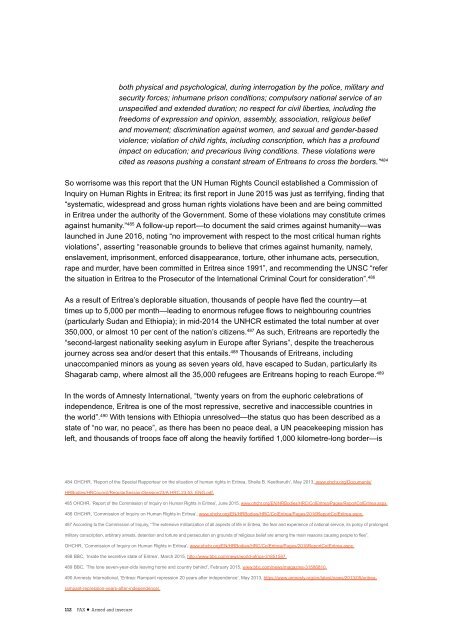Armed and insecure
pax-report-horn-of-africa-armed-and-insecure
pax-report-horn-of-africa-armed-and-insecure
Create successful ePaper yourself
Turn your PDF publications into a flip-book with our unique Google optimized e-Paper software.
oth physical <strong>and</strong> psychological, during interrogation by the police, military <strong>and</strong><br />
security forces; inhumane prison conditions; compulsory national service of an<br />
unspecified <strong>and</strong> extended duration; no respect for civil liberties, including the<br />
freedoms of expression <strong>and</strong> opinion, assembly, association, religious belief<br />
<strong>and</strong> movement; discrimination against women, <strong>and</strong> sexual <strong>and</strong> gender-based<br />
violence; violation of child rights, including conscription, which has a profound<br />
impact on education; <strong>and</strong> precarious living conditions. These violations were<br />
cited as reasons pushing a constant stream of Eritreans to cross the borders.” 484<br />
So worrisome was this report that the UN Human Rights Council established a Commission of<br />
Inquiry on Human Rights in Eritrea; its first report in June 2015 was just as terrifying, finding that<br />
“systematic, widespread <strong>and</strong> gross human rights violations have been <strong>and</strong> are being committed<br />
in Eritrea under the authority of the Government. Some of these violations may constitute crimes<br />
against humanity.” 485 A follow-up report—to document the said crimes against humanity—was<br />
launched in June 2016, noting “no improvement with respect to the most critical human rights<br />
violations”, asserting “reasonable grounds to believe that crimes against humanity, namely,<br />
enslavement, imprisonment, enforced disappearance, torture, other inhumane acts, persecution,<br />
rape <strong>and</strong> murder, have been committed in Eritrea since 1991”, <strong>and</strong> recommending the UNSC “refer<br />
the situation in Eritrea to the Prosecutor of the International Criminal Court for consideration”. 486<br />
As a result of Eritrea’s deplorable situation, thous<strong>and</strong>s of people have fled the country—at<br />
times up to 5,000 per month—leading to enormous refugee flows to neighbouring countries<br />
(particularly Sudan <strong>and</strong> Ethiopia); in mid-2014 the UNHCR estimated the total number at over<br />
350,000, or almost 10 per cent of the nation’s citizens. 487 As such, Eritreans are reportedly the<br />
“second-largest nationality seeking asylum in Europe after Syrians”, despite the treacherous<br />
journey across sea <strong>and</strong>/or desert that this entails. 488 Thous<strong>and</strong>s of Eritreans, including<br />
unaccompanied minors as young as seven years old, have escaped to Sudan, particularly its<br />
Shagarab camp, where almost all the 35,000 refugees are Eritreans hoping to reach Europe. 489<br />
In the words of Amnesty International, “twenty years on from the euphoric celebrations of<br />
independence, Eritrea is one of the most repressive, secretive <strong>and</strong> inaccessible countries in<br />
the world”. 490 With tensions with Ethiopia unresolved—the status quo has been described as a<br />
state of “no war, no peace”, as there has been no peace deal, a UN peacekeeping mission has<br />
left, <strong>and</strong> thous<strong>and</strong>s of troops face off along the heavily fortified 1,000 kilometre-long border—is<br />
484 OHCHR, ‘Report of the Special Rapporteur on the situation of human rights in Eritrea, Sheila B. Keetharuth’, May 2013, www.ohchr.org/Documents/<br />
HRBodies/HRCouncil/RegularSession/Session23/A.HRC.23.53_ENG.pdf.<br />
485 OHCHR, ‘Report of the Commission of Inquiry on Human Rights in Eritrea’, June 2015, www.ohchr.org/EN/HRBodies/HRC/CoIEritrea/Pages/ReportCoIEritrea.aspx.<br />
486 OHCHR, ‘Commission of Inquiry on Human Rights in Eritrea’, www.ohchr.org/EN/HRBodies/HRC/CoIEritrea/Pages/2016ReportCoIEritrea.aspx.<br />
487 According to the Commission of Inquiry, “The extensive militarization of all aspects of life in Eritrea, the fear <strong>and</strong> experience of national service, its policy of prolonged<br />
military conscription, arbitrary arrests, detention <strong>and</strong> torture <strong>and</strong> persecution on grounds of religious belief are among the main reasons causing people to flee”.<br />
OHCHR, ‘Commission of Inquiry on Human Rights in Eritrea’, www.ohchr.org/EN/HRBodies/HRC/CoIEritrea/Pages/2016ReportCoIEritrea.aspx.<br />
488 BBC, ‘Inside the secretive state of Eritrea’, March 2015, http://www.bbc.com/news/world-africa-31851587.<br />
489 BBC, ‘The lone seven-year-olds leaving home <strong>and</strong> country behind’, February 2015, www.bbc.com/news/magazine-31586810.<br />
490 Amnesty International, ‘Eritrea: Rampant repression 20 years after independence’, May 2013, https://www.amnesty.org/en/latest/news/2013/05/eritrearampant-repression-years-after-independence/.<br />
112 PAX ! <strong>Armed</strong> <strong>and</strong> <strong>insecure</strong>


